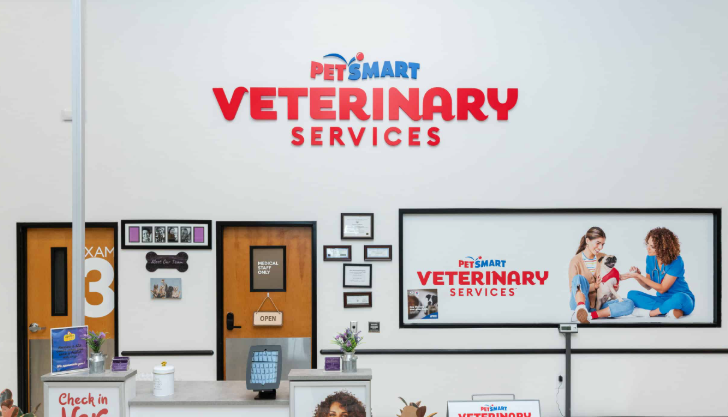PetSmart Vet Prices

2025 Petsmart Vet Prices and Overview of Veterinary Services at PetSmart. Our friends at PetSmart, a leading pet retail chain, extends its commitment to pet health through a variety of veterinary services available at numerous locations across the United States. These services are primarily offered through partnerships with independent veterinary clinics and Banfield Pet Hospitals, ensuring comprehensive care for pets. Understanding the range of services and associated costs can help pet owners make informed decisions about their pets’ healthcare needs.
Low Cost Veterinarians Near Me

Low Cost Veterinarians Near Me. Bridging the Gap: The Vital Role of Low-Cost Veterinarians in Pet Healthcare. The bond between humans and their animal companions is profound, offering unconditional love and unwavering loyalty. However, the rising costs of veterinary care can create a significant barrier, particularly for pet parents on limited budgets.
This is where low-cost veterinary clinics and programs step in, providing a critical lifeline for both animals and their owners. The reality is that veterinary care, like human healthcare, can be expensive. From routine check-ups and vaccinations to unexpected illnesses and surgeries, the costs can quickly accumulate, leaving many pet owners facing difficult choices. Without access to affordable care, pets may suffer from preventable diseases or go without necessary treatments, leading to decreased quality of life and even premature death.
Vets For Parents With Smaller Budgets
Low-cost veterinary services are designed to address this disparity, offering a range of essential treatments at significantly reduced prices. These clinics often operate on a non-profit or sliding-scale basis, meaning that costs are determined based on the pet owner’s income and financial circumstances. This allows individuals and families who would otherwise struggle to afford veterinary care to provide their pets with the necessary medical attention.
What Services Do Low-Cost Veterinarians Offer?
The services offered by low-cost veterinarians can vary, but they typically include:
- Routine Check-ups and Vaccinations: These preventative measures are crucial for maintaining a pet’s health and preventing the spread of infectious diseases. Low-cost clinics often offer affordable vaccination packages and wellness exams.
- Spaying and Neutering: These procedures are essential for controlling pet overpopulation and preventing certain health problems. Low-cost spay/neuter clinics play a vital role in reducing the number of stray and unwanted animals.
- Dental Care: Dental disease is a common problem in pets, and it can lead to serious health complications if left untreated. Many low-cost clinics offer affordable dental cleanings and extractions.
- Basic Medical Treatments: Low-cost clinics can treat a variety of common illnesses and injuries, such as ear infections, skin conditions, and minor wounds.
- Parasite Prevention and Treatment: Fleas, ticks, and heartworms can pose serious health risks to pets. Low-cost clinics offer affordable preventative medications and treatment options.
- Microchipping: Microchipping is a simple and effective way to ensure that lost pets are reunited with their owners. Low-cost clinics often offer this service at a reduced price.
- Euthanasia and Cremation: In cases of terminal illness or severe injury, low-cost clinics can provide humane euthanasia and cremation services at a more affordable cost.
 How Do Low-Cost Veterinarians Make Care More Affordable?
How Do Low-Cost Veterinarians Make Care More Affordable?
Several factors contribute to the lower costs at these clinics:
- Non-Profit Status: Many low-cost clinics are non-profit organizations, which allows them to operate with lower overhead costs and reinvest profits back into the clinic.
- Sliding-Scale Fees: Sliding-scale fees are based on the pet owner’s income, ensuring that those with lower incomes pay less.
- Volunteer Staff: Some clinics rely on volunteer veterinarians and support staff, which helps reduce labor costs.
- Bulk Purchasing: Buying medications and supplies in bulk can significantly reduce costs.
- Focus on Essential Services: Low-cost clinics often prioritize essential services over elective procedures, allowing them to keep costs down.
- Community Support: Donations from individuals, businesses, and foundations can help support the operations of low-cost clinics.
The Impact on Pet Owners and Communities
The availability of low-cost veterinary services has a profound impact on pet owners and their communities.
- Improved Pet Health: Access to affordable care allows pet owners to provide their animals with the necessary medical attention, leading to improved health and well-being.
- Reduced Pet Overpopulation: Affordable spay/neuter services help control pet overpopulation, reducing the number of stray and unwanted animals.
- Strengthened Human-Animal Bond: By making veterinary care more accessible, low-cost clinics help strengthen the bond between humans and their animal companions.
- Reduced Animal Suffering: Access to care prevents unnecessary suffering for animals that would otherwise go untreated.
- Community Health: Controlling rabies and other zoonotic diseases through vaccinations protects the community at large.
- Relief for Pet Parents: The financial strain of pet ownership is greatly reduced, causing less stress for the owners.
 Finding Low-Cost Veterinary Care
Finding Low-Cost Veterinary Care
Pet owners seeking low-cost veterinary care can explore various resources:
- Local Animal Shelters and Rescues: Many shelters and rescues offer low-cost veterinary services or can provide referrals to clinics in the area.
- Humane Societies: Humane societies often operate low-cost clinics or provide financial assistance programs.
- Veterinary Schools: Veterinary schools often offer reduced-cost services provided by students under the supervision of experienced veterinarians.
- Online Resources: Websites like the ASPCA and the Humane Society of the United States provide directories of low-cost veterinary clinics.
- Local Animal Welfare Organizations: Many communities have local animal welfare organizations that offer financial assistance or referrals to low-cost clinics.
- Search Engines: Searching online for “low-cost veterinary clinics” in your area can provide a list of local options.
Low-cost veterinary clinics are not simply a financial solution; they are a vital part of ensuring that all pets have access to quality healthcare. They bridge the gap between financial limitations and the desire to provide the best possible care for beloved animal companions. By offering affordable services, these clinics help strengthen the human-animal bond, improve the health and well-being of pets, and create healthier communities for everyone.

Did you find this article useful? Would you like 100% free access to more articles like these, and free access to over 5,000 vetted pet care service professionals throughout the United States? Sign up here for a free Petworks account, and take 10% off your first booking, on us!
The Potential Downsides of Low-Cost Veterinary Care
1. Limited Services and Diagnostics
One of the biggest concerns with low-cost veterinary care is the limitation of services. Many budget-friendly clinics focus on basic procedures and preventive medicine, but they may lack advanced diagnostic tools such as ultrasounds, X-rays, and in-house laboratory testing. If a pet has a complex health issue, the clinic may not have the resources to diagnose or treat the condition properly, requiring a referral to a full-service veterinary hospital.
2. Less Personalized Care
Low-cost veterinarians often work in high-volume settings, meaning they may see dozens of pets in a single day. As a result, appointments tend to be brief, and pet owners may not receive in-depth consultations or thorough examinations. This lack of individualized attention can sometimes lead to overlooked health concerns or inadequate follow-up care.
3. Inconsistent Quality of Care
While many low-cost veterinarians are highly skilled professionals who prioritize animal welfare, there can be inconsistencies in the level of care provided. Some clinics may cut corners to keep costs low, such as using lower-quality medications, outdated equipment, or minimally trained staff. In some cases, the rushed nature of high-volume clinics can lead to medical errors or misdiagnoses.
4. Potential Hidden Costs
Although low-cost veterinary clinics advertise budget-friendly services, pet owners should be wary of hidden costs. Some clinics charge extra for medications, follow-up visits, or additional tests that may not have been initially discussed. In other cases, pet owners may find themselves paying more in the long run if an undiagnosed condition worsens and requires expensive emergency care at a full-service hospital.
How to Choose the Right Veterinary Care for Your Pet
1. Research the Clinic’s Reputation
Before choosing a low-cost veterinarian, do some research. Read online reviews, ask for recommendations from other pet owners, and check whether the clinic is affiliated with reputable organizations. Veterinary schools and nonprofit clinics often maintain high standards, while some for-profit low-cost clinics may vary in quality.
2. Understand the Scope of Services
Determine what services the clinic offers and whether they align with your pet’s needs. If your pet has ongoing medical conditions, you may need a full-service vet rather than a low-cost clinic. Ask about diagnostic capabilities, emergency services, and follow-up care options.
3. Ask About the Veterinarian’s Credentials
Ensure that the veterinarians at the clinic are licensed professionals with experience in the field. Some budget clinics employ recent graduates or veterinary technicians who provide care under supervision. While this isn’t necessarily a red flag, it’s important to know who will be treating your pet.
4. Be Prepared for Referrals
If your pet has a complex medical issue, be open to referrals. Low-cost clinics may not have the resources to handle severe illnesses or injuries, and a full-service veterinary hospital may be necessary for advanced care. Understanding this limitation can help you plan financially for potential higher-cost treatments.
5. Balance Cost with Quality
While affordability is essential, don’t compromise your pet’s health to save money. If a clinic’s practices seem rushed, unprofessional, or lacking in hygiene standards, consider looking elsewhere. Low-cost vet care can be beneficial, but pet owners must remain vigilant in ensuring their pets receive quality treatment.
Finding The Right Balance
Low-cost veterinarians provide a valuable service, making basic pet healthcare accessible to a wide range of pet owners. However, there are trade-offs to consider. While affordability is important, pet parents should be cautious about potential limitations in service quality, diagnostic capabilities, and personalized care.
The key to making the most of low-cost veterinary care is being informed. Research the clinic, ask the right questions, and be realistic about what services are available. In some cases, a low-cost vet may be an excellent choice for routine care, while more specialized treatment may require a traditional veterinary hospital. By striking the right balance, pet parents can ensure their furry companions receive the care they need without unnecessary risks or financial strain.
 In 2021, Dr. Marty Goldstein DVM joined the pet care platform Petworks as an advisor in its Animal Nutrition care division. Dr Marty Nature’s Blend is on a mission to help your pets live their healthiest lives possible. Dr. Marty’s pet nutrition expertise and guidance has helped Petworks evolve and become the preeminent animal and pet nutrition consultation service for pet parents in North America.
In 2021, Dr. Marty Goldstein DVM joined the pet care platform Petworks as an advisor in its Animal Nutrition care division. Dr Marty Nature’s Blend is on a mission to help your pets live their healthiest lives possible. Dr. Marty’s pet nutrition expertise and guidance has helped Petworks evolve and become the preeminent animal and pet nutrition consultation service for pet parents in North America.
 In 2022, Blue Buffalo Founder Bill Bishop Jr. joined Petworks as Senior Advisor in our Animal Nutrition Care Division. Bill brings his extensive expertise in pet food innovation and business leadership. His guidance helps Petworks enhance our pet nutrition service offerings, helping to ensure that pet parents throughout the world receive trusted, science-backed nutritional support for their dogs, cats, and animals.
In 2022, Blue Buffalo Founder Bill Bishop Jr. joined Petworks as Senior Advisor in our Animal Nutrition Care Division. Bill brings his extensive expertise in pet food innovation and business leadership. His guidance helps Petworks enhance our pet nutrition service offerings, helping to ensure that pet parents throughout the world receive trusted, science-backed nutritional support for their dogs, cats, and animals.
 Petworks Co-Founder Kevin Kinyon is a life-long animal lover who works tirelessly to improve the lives of pets and their parents. Human and animal qualities he values most are integrity, humor, and empathy.
Petworks Co-Founder Kevin Kinyon is a life-long animal lover who works tirelessly to improve the lives of pets and their parents. Human and animal qualities he values most are integrity, humor, and empathy.


